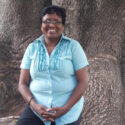Mary Kamotho, who has always lived and worked in Kenya, dedicating herself to improving health and education in her country, decided to become a Loreto sister by family tradition, by formation and by inspiration. She is very grateful that the re-union of the congregations operating in the name of Mary Ward is happening in her time.
Which is your mission at the moment?
I live in Loreto Convent Valley Road. It is a school community. Within the compound, we have a primary and secondary school. We are eight sisters in the community currently. Five work in the two schools and three of us work away from the compound. I am currently a community leader of the house. I am also a tutor in a nursing college, something that I also enjoy doing. In the course of my work, I take the opportunity to impart on the nursing students human and Christian values and hope that I will take part in forming a generation of holistic and caring nurses.
When and how you did you get to know the congregation?
I got to know the congregation as a child since my aunt (Teresa Wanja) is a Loreto sister. I also attended a Loreto secondary school where we had Loreto sisters on staff. While in college, I was in a parish youth group that had a Loreto sister as an advisor. All these experiences impacted on my life and therefore on my decision to be-come a Loreto sister. Plus of course, the books I read on Mary Ward which inspired me greatly as a young girl. I joined the congregation in the year 2002.
What inspires you about the work of the congregation?
I am inspired by the diversity of our engagement in different parts of the world. I am inspired by the fact that each member brings a different kind of giftedness, which they then generously give to the world.
How does the vision and mission of Mary Ward interconnect with your own values and life?
Mary Ward had a particular saying that has inspired me throughout my life as a Loreto sister. “Many think it’s nothing to do ordinary things, but to do ordinary things well by God’s grace will maintain fervour.” I believe this is the core of my calling. I may not necessarily be called to do great things, but to do ordinary things well, to find God wherever I am missioned and to meet God in the people I am missioned to. This is what gives meaning to my life daily.
Would you like to share something of your life as a sister?
I joined the congregation as a registered nurse and immediately after profession, I was missioned to work in an informal settlement (Mukuru) as a clinical nurse in a health facility owned by Christian brothers. I worked with patients with TB and HIV, nutrition programs for vulnerable children as well as running clinics for pregnant and lactating mothers. The health facility also offered primary health care to the community where we visited the clients in their homes. I found this to be a very enriching ministry where I experienced the community spirit of Mukuru people and the care the poor people there had for each other.
Is there any other ministry where you would like to serve?
I am open to serve in any other ministry and in any country. Other than working as a nurse, I enjoy teaching pastoral and Catechism. Plus, I love teaching on Mary Ward, something I have occasionally done with our Candidates.
What are your feelings/thoughts about the union?
I am full of hope as regards the reunion. I am also grateful that it may happen in our time after very many attempts in the history of our Institute. I see the strive towards reunion as a sign of the active presence of the Spirit of God among us.
How do you see the Union of the IBVM/CJs benefitting the network moving forward? Which are the challenges?
I see the re-union benefitting us by widening our scope of engaging with the world. It may also open up our worlds so that as we engage with parts of the world we have never been before, we may gain newer and broader perspectives. I believe the re-union will give us a stronger voice together for justice, for women and the vulnerable in our world. The challenge I see may be only one. Each of our two Institutes have their own culture acquired over the years. Although we share very much in common, yet we have lived independent of each other since inception. Therefore, adapting to each other Institute’s culture may be an initial challenge.
What do you hope for the future of the congregation?
My hope is that as Institute, we continue to grow into the dream of God of us. And that we may have the spirit of Mary Ward who “listened to God’s deep dream for her and felt a longing to respond”. My prayer then is that as Institute we may listen deeply to God’s dream for us to-day and desire to respond.


